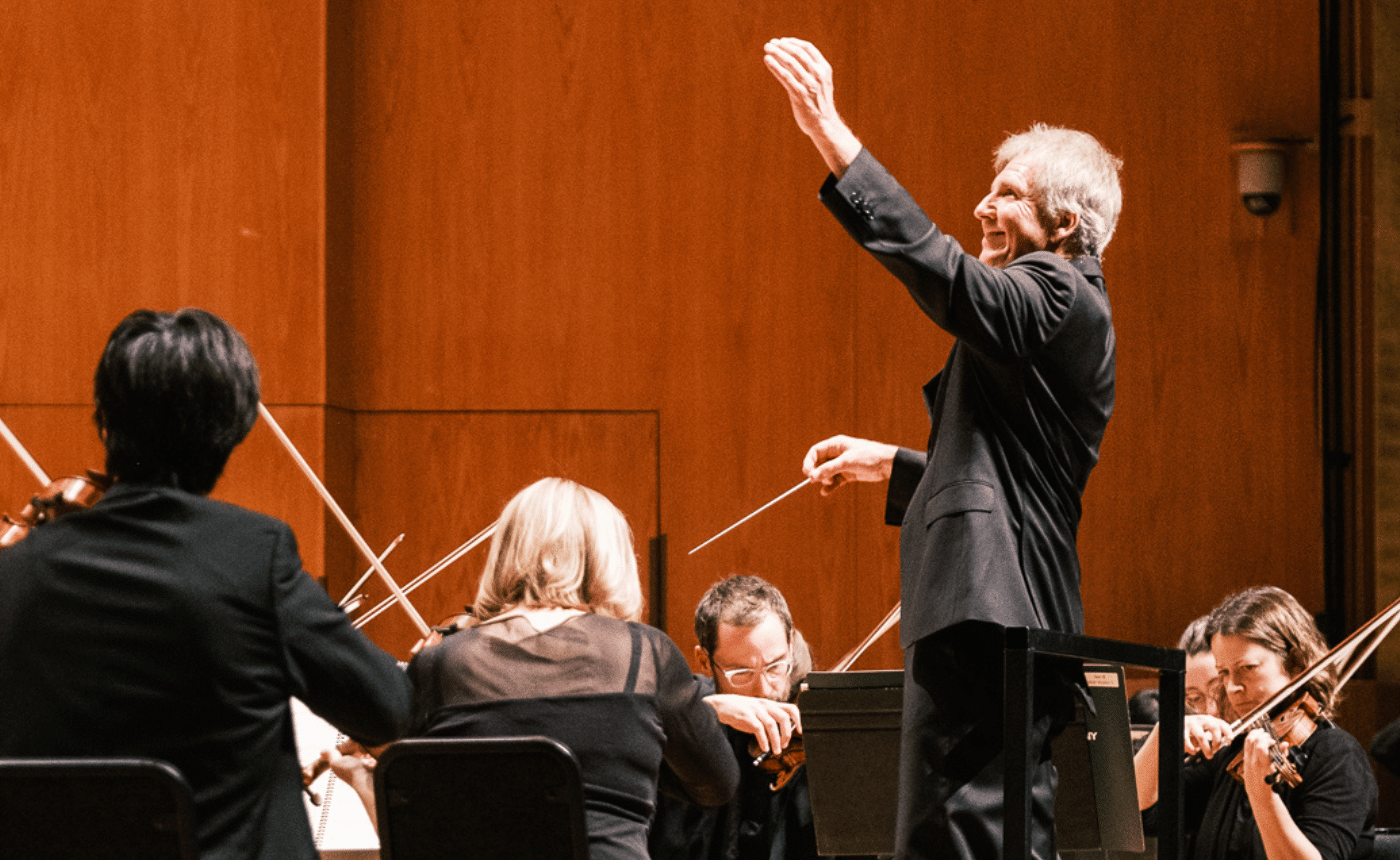30 Jan 2017
Maurice Abravanel's Legacy: Passion for access to the arts and Utah Symphony's outreach to local and rural schools
The fascinating life and remarkable legacy of Maurice Abravanel has left a permanent mark on the music community in Utah. After an immensely successful early career conducting around the world and becoming the youngest conductor ever hired by New York’s Metropolitan Opera at the age of 33, Abravanel, offered the opportunity to “have his own symphony,” took the position as Music Director of the very little known Utah Symphony, a group of part-time local musicians. But he saw the potential and turned his 1 year contract into more than 30 years of impassioned service from 1947 to 1979.

Abravanel said, “I feel that some of my greatest musical experiences with the symphony were in high school gymnasiums.”
During his tenure with the Utah Symphony, Abravanel created a world-renowned, professional orchestra—one of only 15 in the United States that presently sustain a full-time symphony. What is less known about his service was that he was also a champion for the greater community of the arts in Utah, particularly for schoolchildren. Maurice Abravanel cared deeply for his adopted home in Utah and “he got to know the community beautifully,” according to symphony violinist, Frances Darger. Abravanel inaugurated Utah’s first dedicated arts outreach to schools, performing as many school concerts as possible across the intermountain west, garnering enough interest to be featured in the New York Times for his education outreach. This love for the community and belief in the inspiration that music can bring to children motivated him to become the principal advocate for the Professional Outreach Programs in the Schools (POPS) funding from the Utah State Legislature in 1975, with assistance from Senator Haven Barlow—the longest serving legislator in Utah history. Overtime, POPS grew to include funding for the Utah Opera, Ballet West, Utah Shakespeare Festival and others to provide outreach to Utah schools. Currently, because of these efforts, up to 400,000 K-12 students each year, have access to world-class performing arts to enrich their lives and education. Because of this program, Utah Symphony still gives school performances but now they are able to reach every school district in the state (on 3 year cycles), performing more than 40 in-school concerts per year as well as 10 concerts for 5th graders in Abravanel Hall each spring.
Michael McDonald, theatre teacher and district arts coordinator in Eureka, Utah, expressed great appreciation and need for the program: “We have a really small community with high poverty rates and minimal access to fine arts and so it’s amazing that they can make it out here for a concert and have time with the kids.” Symphony concerts in rural areas will often also welcome the community to attend the performance at the school, or do an additional evening performance to include all community members.
The many advocates for the POPS outreach program and Utah Symphony | Utah Opera over the years include Senator Margaret Dayton who has tirelessly advocated for the arts, Utah Symphony and the POPS program; Senator Haven Barlow’s son, Representative Stewart Barlow, who has continued his father’s passion for service and making the arts accessible; as well as Representative Patrice Arent.
 Arent recalls her experiences with Abravanel, who was part of her Jewish community growing up: “He loved to talk to younger people, like me, about music and what the symphony was doing—his enthusiasm was incredibly contagious.” Abravanel’s insistence that “every concert was the most important concert,” according to cellist Bonnie Mangold, was what created that accessibility for children that he loved providing in concerts. A lot of the students found it difficult to understand his accent, but he enjoyed the performances immensely. He once said to symphony flutist Ralph Gochnour: “I feel that some of my greatest musical experiences with the symphony were in high school gymnasiums.” Current Utah Symphony trumpeter Jeff Luke comments after 13 years performing concerts in schools: “I think these performances were significant to Maestro Abravanel, as they are to me, because the kids are so appreciative. Many of them literally have never heard classical music before. They are happy to participate with us when it comes to clapping rhythms, or even dancing with the music, and they always give us an enthusiastic standing ovation at the end of the concert. We know we have made a difference and that feels good.”
Arent recalls her experiences with Abravanel, who was part of her Jewish community growing up: “He loved to talk to younger people, like me, about music and what the symphony was doing—his enthusiasm was incredibly contagious.” Abravanel’s insistence that “every concert was the most important concert,” according to cellist Bonnie Mangold, was what created that accessibility for children that he loved providing in concerts. A lot of the students found it difficult to understand his accent, but he enjoyed the performances immensely. He once said to symphony flutist Ralph Gochnour: “I feel that some of my greatest musical experiences with the symphony were in high school gymnasiums.” Current Utah Symphony trumpeter Jeff Luke comments after 13 years performing concerts in schools: “I think these performances were significant to Maestro Abravanel, as they are to me, because the kids are so appreciative. Many of them literally have never heard classical music before. They are happy to participate with us when it comes to clapping rhythms, or even dancing with the music, and they always give us an enthusiastic standing ovation at the end of the concert. We know we have made a difference and that feels good.”Representative Arent has also visited schools as a legislator for a variety of POPS concerts: “I can watch them become quiet and attentive when the program starts and they start to get excited about Shakespeare or Mozart for the first time. It’s just thrilling to be there.” Likewise Senator Margaret Dayton shares her experience living in rural Carbon County: “It was a highlight for the community to have the Symphony perform at Carbon High School on a regular basis. [It] created culturally enhancing opportunities that many rural citizens would not otherwise have. Truly the citizens of our state are blessed and benefitted by the Utah Symphony.”
Abravanel’s goals for his symphony and for music included that not only should music be performed in an emotional and connective way but also that it has the capacity to change lives. Craig Fineshriber, the principal percussionist in the orchestra for nine years during Abravanel’s tenure, recalled working with Abravanel on a difficult piece when the Maestro said “’We need to work harder on this part. Let’s make it beautiful. Not because you are musicians, but because you are human beings.’ And that’s the way he looked at it,” Fineshriber remarked, “Being a great musician or being a great anything makes you a better human being, and that’s what it’s about. That’s what art is about.” The tradition of sharing the life-changing power of music continues for generations of school children who have benefited not only from the beauty of music but of the personal development that it can nurture. Michael McDonald comments on his school’s recent visit from the Symphony and the individual time symphony members spent in the classroom: “This year was the best time we’ve ever had with the symphony. It was so personal. It gave the kids a view into the path of person who has become a successful person, not just as a musician but as a member of society.”
While the prestige that Maestro Abravanel almost single-handedly created for the Utah Symphony would have been more than enough to create a prominent legacy, his passion for music and the arts brought him to desire that all people could access it and be inspired by it as he was. The breadth and depth of arts outreach provided by the POPS program, which also funds ongoing Utah Symphony outreach, stretches this legendary conductor’s legacy for generations beyond his own time.
You can learn more about Utah Symphony | Utah Opera educational opportunities and resources available by visiting usuoeducation.org.













